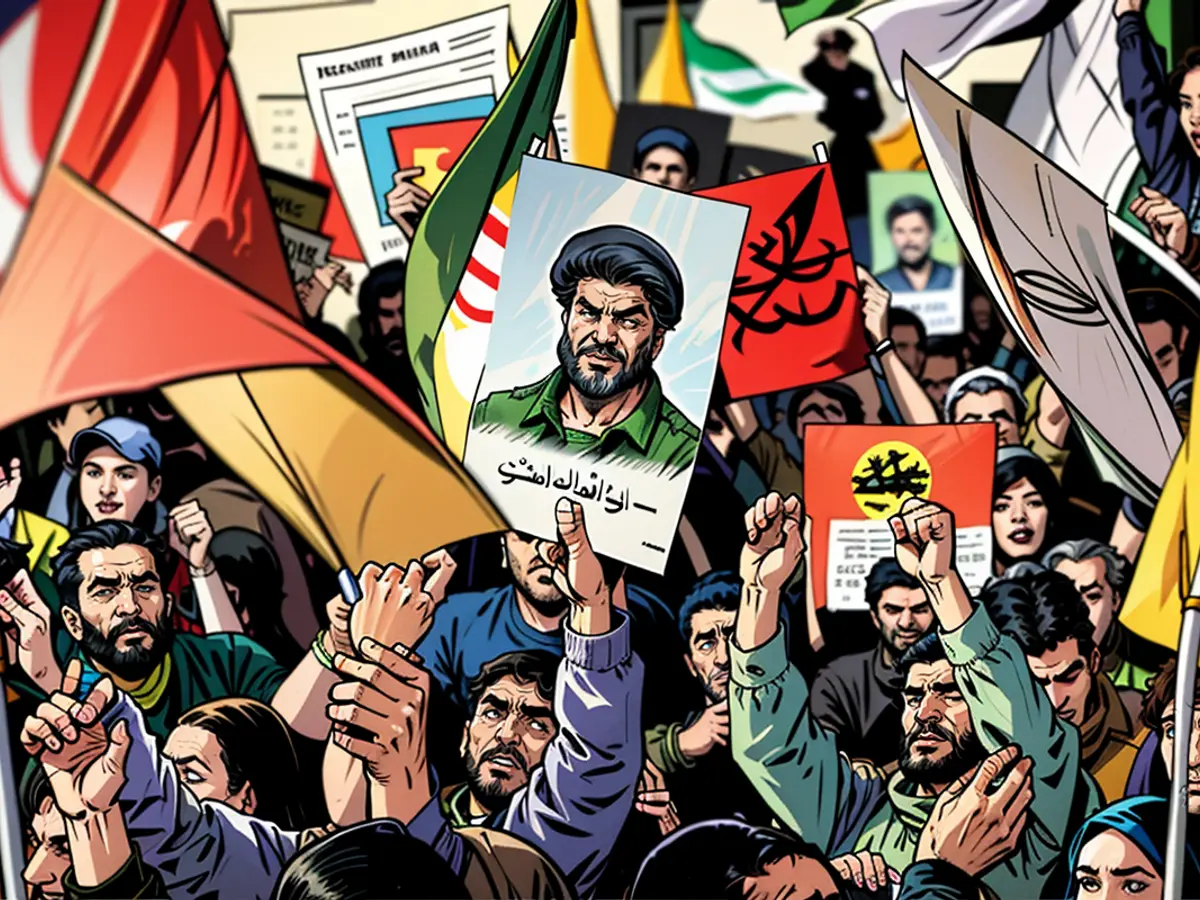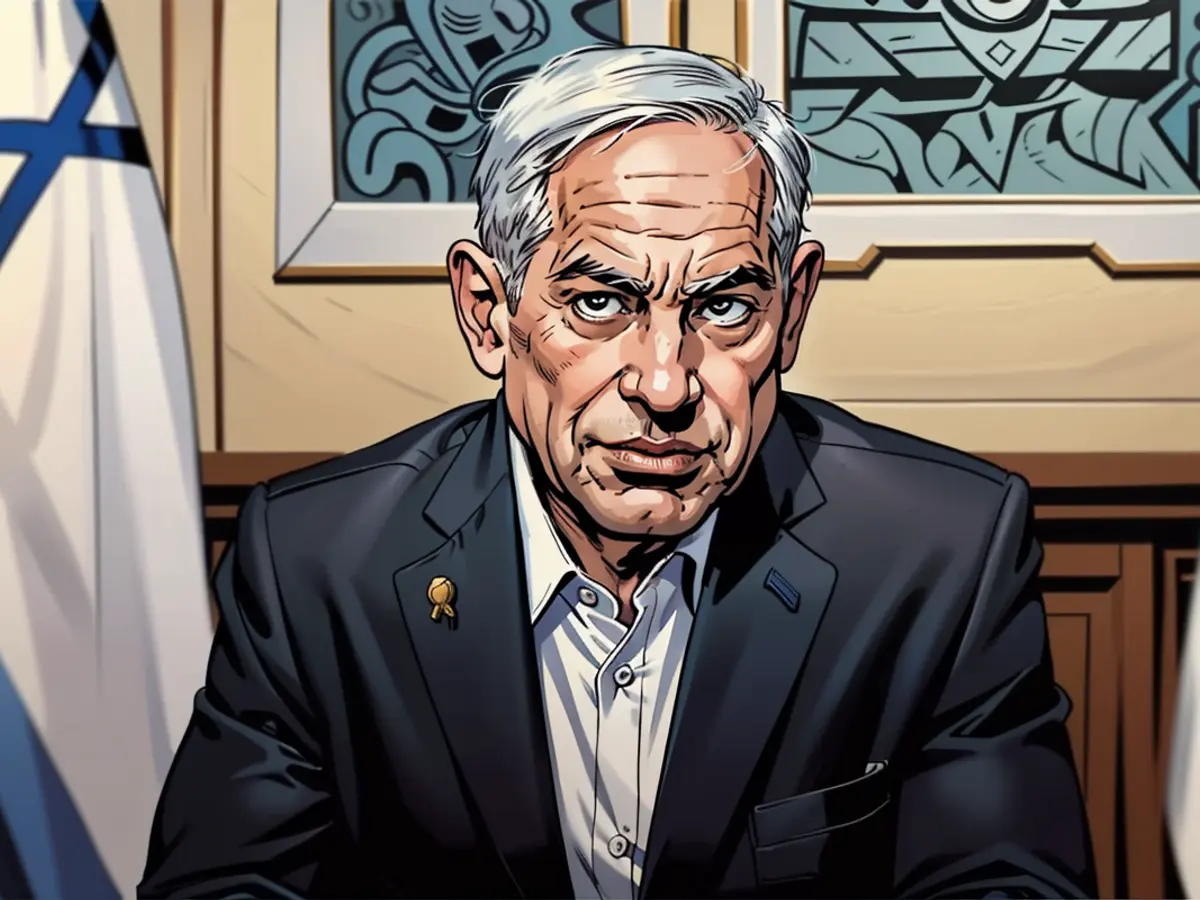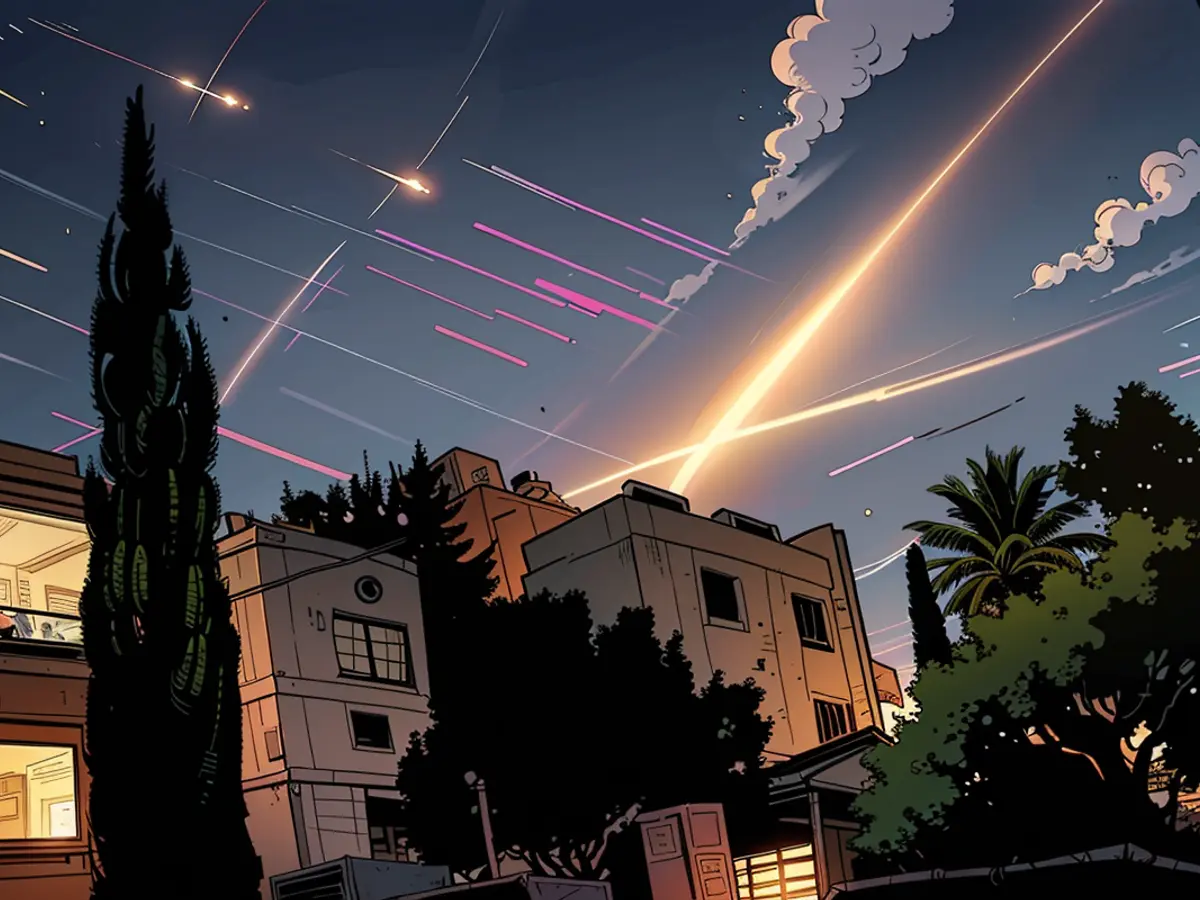Israel's potential responses to Iran's missile attack: Insights into their likely actions
Iran made a significant blunder tonight, and they'll pay the consequences, declared Israeli Prime Minister Benjamin Netanyahu a few hours following an unprecedented attack.
Iran let loose approximately 200 ballistic missiles towards Israeli military targets, marking their largest such attack yet. The missiles triggered sirens throughout Israel and activated the country's advanced defense systems.
Iranian leadership claimed that the attack served as a warning to Israel, warning against engaging in a direct conflict with their long-time adversary. Any response from Israel would be met with "more potent and excruciating" counterattacks, they warned.
The situation escalated less than 24 hours after Israel initiated a ground invasion in Lebanon with the intention of targeting Hezbollah, a powerful militant organization backed by Iran. The escalation came shortly after Israel assassinated Hezbollah's leader, Hassan Nasrallah, in a strike on Beirut.
Facts of the situation:
Middle East Conflict Expands
Tuesday's attack amplified the scope of the conflict, shifting from a battle involving Iran's proxies to a direct confrontation between two formidable regional military powers.
An Israeli military source told CNN that multiple Iranian missiles struck Israeli military facilities during the attack, albeit with little damage to the installations.
Iran launched an aerial strike against Israel just twice this year, the most recent one being Tuesday's barrage, a significant escalation from their previous attack which occurred in April.
In April, Iran retaliated against a suspected Israeli strike on an Iranian diplomatic complex in Syria by launching a large-scale drone and missile attack on Israel. Despite the large number of projectiles targeted at Israel, diplomatic and deterrence efforts by the US helped minimize damage, CNN sources stated.
Israel retaliated with a limited strike on Iran in the aftermath of the April attack.
In contrast, Israel received just a few hours' notice before Iran launched the Tuesday barrage, with targeted locations including Mossad intelligence agency headquarters in Tel Aviv, Israel's second-largest city, Nevatim Air Base, and Tel Nof Air Base.

Maj. Gen. Pat Ryder, Pentagon spokesperson, declared that Tuesday's barrage was doubly larger than April's attack and largely consisted of ballistic missiles, which are harder to intercept. The stronger impact of the strikes damaged some Israeli homes and forced citizens to seek shelter.
Has Middle Eastern Diplomacy Failed?
Negotiations to conciliate between Israel and Hezbollah have faltered, as have ceasefires and hostage talks between Hamas and Israel. Even recently, senior US officials had suggested that Washington's diplomatic and deterrence strategies had successfully deterred a comprehensive Iranian attack on Israel.
However, recent Israeli actions, such as eliminating Hezbollah's leadership and launching strikes against other Iran-backed militant organizations, have increased regional tensions and pushed the conflict towards potential all-out war.
The Path Towards Conflict
Over the past year, recurring escalations have eventually ushered the region to the brink of war time and time again.
In recent days, Israel's ground operations in southern Lebanon have opened another front, while Israel has ratcheted up its strikes on other Iran-backed militant factions, including the Houthis in Yemen.
Israel's persistent attacks have gradually degraded Hezbollah's leadership and infrastructure in Lebanon, resulting in more than 1,000 fatalities, displacing approximately 1 million individuals, and leaving countless homes and neighborhoods in ruins.
The battle between Hamas and Israel has gone on for close to a year, with the conflict leading to over 41,000 fatalities and the creation of a catastrophic humanitarian crisis.
Hamas, Hezbollah, and the Houthis are all members of an Iranian-led alliance, which engages in assaults against Israel and its allies in Gaza, Syria, Yemen, and Iraq. They insist that they will not cease hostilities until a ceasefire agreement is reached in Gaza.
Future Actions from Both Sides

Iran claims that its actions were a measured response to Israel's repeated provocations.
Iran's Islamic Revolutionary Guard Corps stated that Tuesday's missile strikes were focused on Israeli security and military targets in response to Israel's assassination of Nasrallah and other commanders, such as Hamas' political leader, Ismail Haniyeh, in Tehran in July.
Following the assassination of Hamas' most prominent political figure during the inauguration of Iran's new president, the international community waited with bated breath to see how Tehran would respond.
However, Tehran remained quiet for months, lessening tensions via diplomatic and deterrence efforts due to the significant repercussions of a full-scale war in the Middle East.
But Israel's escalations and the expanding conflict in Lebanon have drastically altered the equation.
On Saturday, Netanyahu delivered a fiery speech directed at Iran, asserting Israel's role in "shifting the balance of power in the region" and that "there is no place in Iran or the Middle East that the long arm of Israel will not reach."
Nasrallah's death, according to Netanyahu, was vital for returning thousands of residents along the Lebanon border who had been displaced due to Hezbollah rocket attacks and preventing a large-scale attack by the organization on Israel.
American authorities have consistently believed that both Iran and key Hezbollah leaders aim to avoid a full-scale conflict with Israel, despite their occasional skirmishes.
A major concern for American and Arab diplomats is the prospect of Israel launching an attack within Iran, possibly targeting its nuclear facilities. Former Israeli Prime Minister Naftali Bennett advocated for retaliation by wiping out its nuclear program.
Iran has made it clear that any Israeli retaliation would spark further escalation. Iran's President Masoud Pezeshkian stated on Tuesday that the recent operation was only a small portion of Iran's power.
Israel may be considering Iran's nuclear facilities as it plans its response to Tehran's missile attack, as per Malcolm Davis, senior analyst for defense strategy at the Australian Strategic Policy Institute.

"From Israel's perspective, it can't allow Iran to acquire nuclear weapons. There would be significant pressure within Netanyahu's cabinet to attack those nuclear facilities, essentially delaying the Iranian nuclear weapons program for potentially years," Davis told CNN's Becky Anderson.
Hezbollah also presents a significant threat to Israel with its stockpile of military resources.
However, Salam Vakil, director of the Middle East and North Africa program at Chatham House, believes Tehran is consciously hoping "there will be some restraint."
"Iran is laying down some red lines, knowing well that it's in a defensive position, that Hezbollah is compromised, and that it doesn't have the conventional capabilities to confront Israel," he told CNN's Anderson.
US Role
The US, Israel's main ally and primary weapons supplier, has promised to work with Israel in response to the attack, with State Department spokesperson Matthew Miller warning of consequences.
American Navy destroyers fired interceptors against the Iranian missiles, and in recent weeks, the US has moved additional troops and warships to the region.
Since Israel's conflict in Gaza started, US troops have also been subject to escalating attacks by Iran-backed proxy groups. In January, three US Army soldiers were killed and over 30 service members injured in a drone attack on a small US outpost in Jordan.
During this time, the US has consistently stood by Israel. Defense Secretary Lloyd Austin stated that the US will "never waver" in protecting US forces and interests in the Middle East, and that the US remains prepared and "postured" to defend its own forces and Israel.
CNN's Lauren Izso, Ivana Kottasová, Paul P. Murphy, Andrew Raine, Allegra Goodwin, Lucas Lilieholm, Kylie Atwood, Avery Schmitz, Benjamin Brown, Gianluca Mezzofiore, MJ Lee, Katie Bo Lillis, Haley Britzky, Leila Gharagozlou, Tara John, Oren Liebermann, Natasha Bertrand, Jennifer Hauser, Jomana Karadsheh, Mostafa Salem, Artemis Moshtaghian, and Jeremy Diamond contributed reporting.
Iran's attack on Israeli military targets served as a warning to the global community that tensions in the Middle East are escalating, potentially leading to a direct conflict between major regional powers. The world should pay close attention to the situation in the Middle East, particularly in the context of Iran's continued escalations and Israel's responses.
Alarmingly, Iran's missile strikes this year, including the one in April and the recent barrage, indicate a pattern of escalating aggression towards Israel. This escalation could have far-reaching implications for the Middle East and potentially impact global stability.








